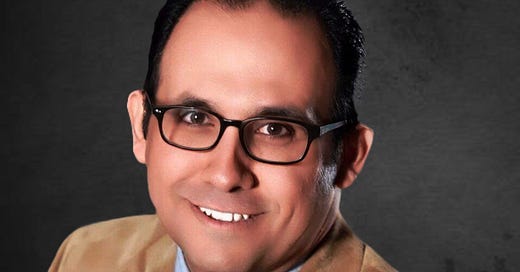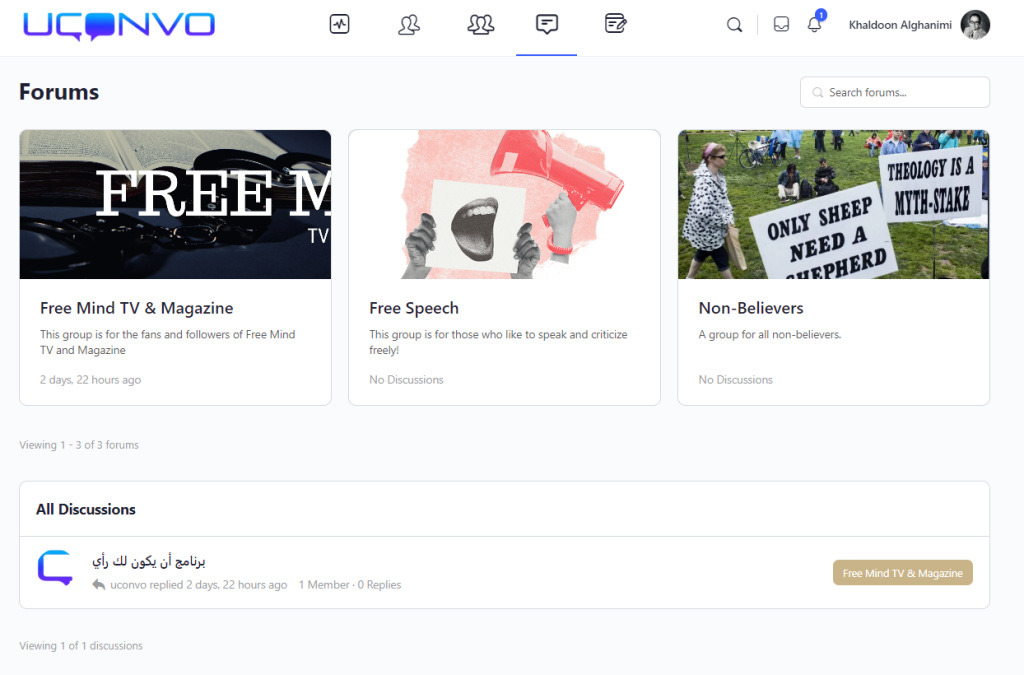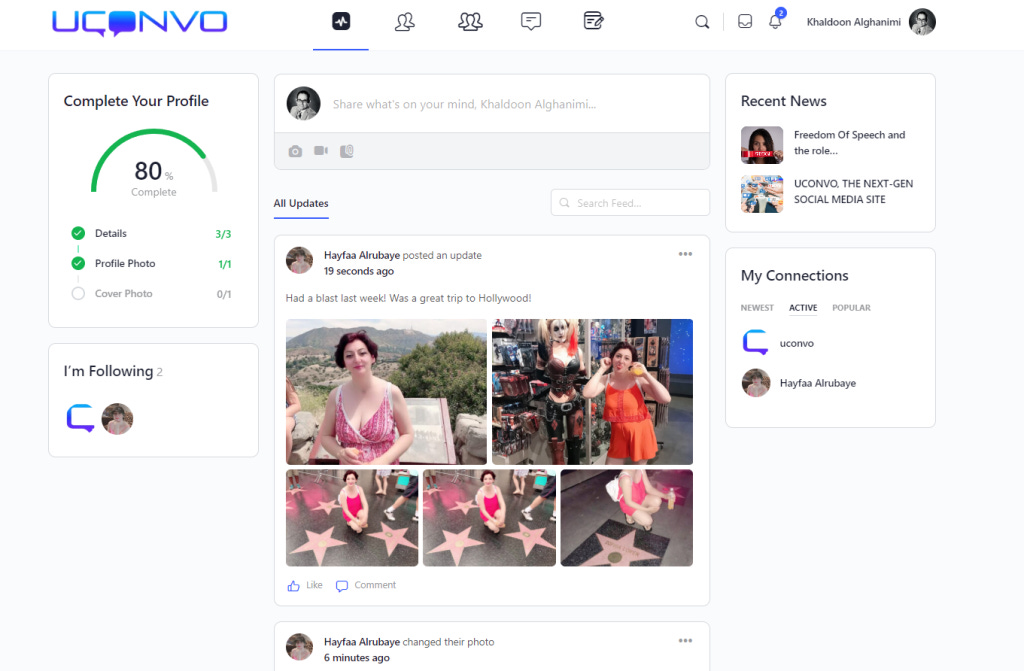Social media free of censorship in the Middle East and abroad
UCONVO is a new social media platform that plans to prioritize freedom of speech and respect diversity of opinion in a bid to democratize expression online
Khaldoon Alghanimi does not support the social media bans on Donald Trump. In his view, the move by Facebook, Twitter, and Google to suspend the former US President from his favorite platforms violates freedom of speech, and nobody has the right to do that. “People are entitled to their opinions, no matter what opinions they have,” he says.
Alghanimi does not support Trump, but blocking him from using social media platforms is a form of censorship that sits uneasily with him. “When we ban someone for their ideas, it means we don't allow the ideas to conflict with each other… The first step to a free world is a conversation. A conversation requires at least two sides to be willing to listen and learn from each other and debate afterward intellectually and freely.”
That’s why he is launching a new social media platform called UCONVO
where users can express their views in an atmosphere of open exchange. “Facebook, Twitter, and most other giant names in the social media world don’t really care about freedom of speech or providing their platform for a cause…they are focused on being profitable businesses,” he says.
There are caveats. Incitements to violence will be blocked, but not the user who posts them. “I’m against blocking people on the grounds of their views,” Alghanimi explains. But if a user begins trolling someone, then they will be made unwelcome on the platform. “I would block them from being in touch with the person they are trolling, but not block them completely from the platform.”
He hopes that UCONVO, which is staffed by volunteers who share Alghanimi’s commitment to creating an environment where expression can flourish, will attract free thinkers and those willing to learn from and converse with others. He has seen the stifling effect of social media censors. “I have friends who have lost their social media profiles many times because they said something critical about religion.”
The danger of this, he adds, is that it shuts down debate.
In Alghanimi’s native Iraq, discussions about religion are a first step to confronting sectarian tensions that divide the country. Violence between different groups is commonplace and contributes to deep-rooted social, economic, and political problems that undermine the struggle to create a functioning modern state.
Alghanimi is all too aware of the effect one-sided thinking can have. As a young man, he was a religious scholar in Najaf, an Iraqi city considered sacred by Shia Muslims. Inspired by his grandfather, he joined a Shiite seminary aged 17 and spent seven years teaching and studying his faith. “I was a Muslim scholar and extremely religious,” he recalls.
Eager to expand his learning, he took a bachelor's degree in French language and literature at the University of Baghdad. “I discovered something different,” he says. “I was a theologian, and when you study philosophy and literature from a different perspective, if you are honest with yourself, it makes you re-examine your beliefs.” One book, in particular, stood out, L’etranger by Albert Camus.
It's a book that contains questions about the world, existence, and the meaning of life. “The horizon widened for me. I started to examine everything,” Alghanimi says. In 2000, he left the seminary, no longer able to relate to the views they espoused. It was a sad time. “When you are a person of faith, you feel safe and at peace because there is this sense that someone is looking after you. Everything you do within your faith is good, and others who disagree are most likely evil or bad.”
A few years later, he started to receive threats that forced him to leave the country in 2007.
His move to the US in 2014 reinforced his changing perspective. “In general, there is not a very positive view of Westerners in the Middle East, but the first impression I had was that they are just like us, ordinary people; there are good and bad wherever you go.”
His upbringing had taught him to be suspicious of non-Muslims, a view he was expected to pass on to the young people under his care in the seminary.
“I realized how bad it is to teach your children that this religion, your god, your faith is the only good thing in your life, and everything else is bad.” He studied other faiths, exploring Christianity, Judaism, and Buddhism, before moving away from religion altogether. “ Atheism seemed to offer me a more reasonable explanation of life.”
This has caused him problems. After leaving Najaf, religious clerics hounded his family, detaining his brother-in-law and demanding more information about what they saw as an attack on Islam. Visiting Iraq for work in 2013, Alghanimi narrowly escaped an assassination attempt when he was shot at in the street, and he says there are at least two fatwas against him from religious institutions in Egypt and Iraq.
But these attempts to enforce views he no longer agreed with only fuelled his desire to speak openly, so in 2014 he set up Free Mind TV to create secular shows free from religious and political censorship. The channel, which is run from his home in the US, explores secularism, religions, history, and politics with a view to helping people in the MENA region accept their differences.
“We aim to empower secular activists and like-minded individuals around the world,” Alghanimi says. In recent years though, it has become increasingly difficult to get guests on the channel. “People are afraid of showing their face on our channel and being linked to atheism,” he explains.
“That’s when I thought we need a platform that is administrated and owned by a secular organization or individuals. UCONVO is the new era of social media platforms, where censorship has no place,” Alghanimi says.
It’s taken years of preparation to develop the new platform and raise funds, with help from Ideas beyond Borders, which has provided a grant to cover the site’s hosting services for the first five months through their innovation hub program.
"Innovative platforms like UCONVO are exactly what the middle east and the world need; the world needs more dialogue and ideas and less censorship whether it's coming from the state or imposed by the self," says Faisal Saeed Al Mutar, the founder of Ideas Beyond Borders.
The launch date is now set for September and Alghanimi is optimistic about UCONVO’s appeal. “This will be a platform where you don’t have to be someone else; you don’t have to pretend. You are entitled to have your opinion, no matter what opinion you have - unless you are inciting violence,” he says.





